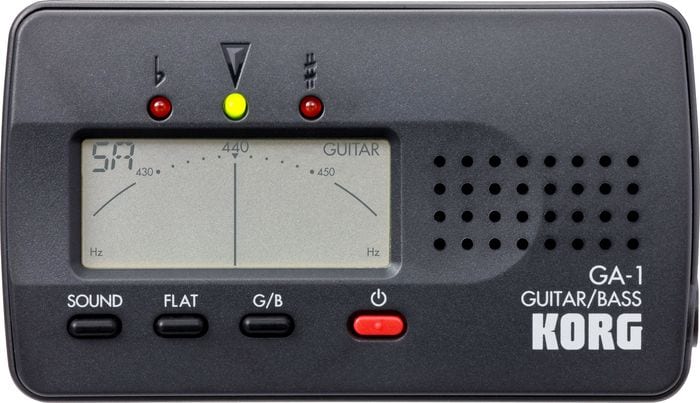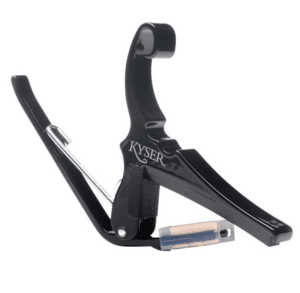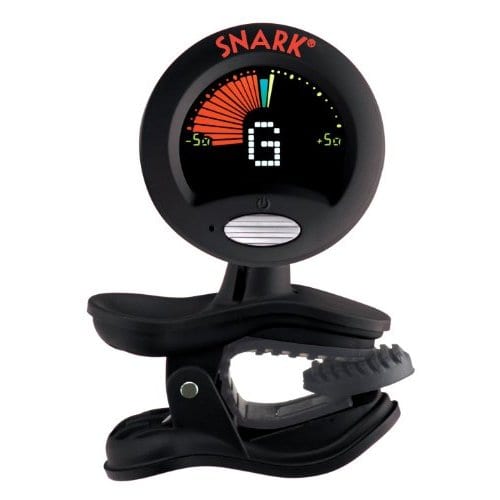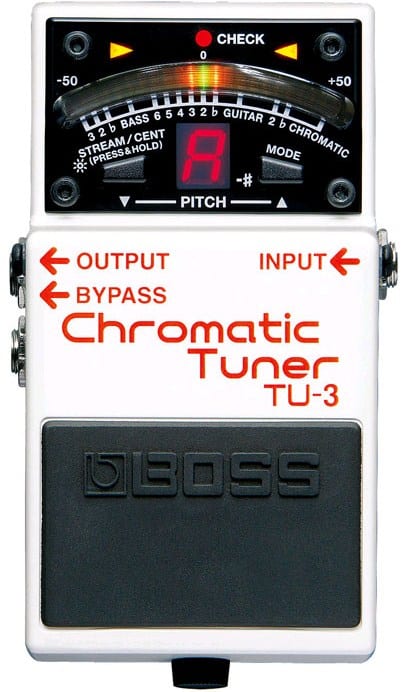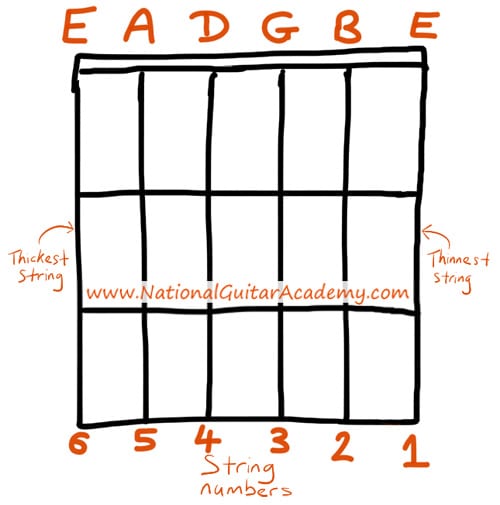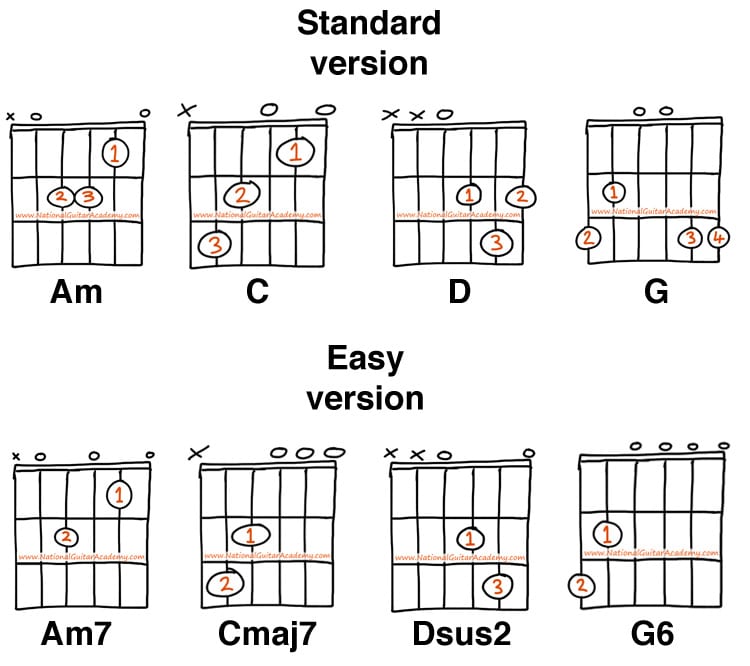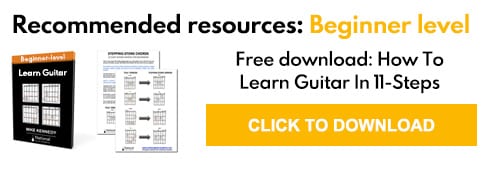Wondering how to learn guitar? This free guide will give you an 11-step roadmap you can follow.
In this free guitar lesson you’ll learn everything you need to get off to a perfect start.
- Quick-start gear guide: Guitars, tuners, picks etc.
- The secret way to learn chords at lightning speed
- How to hold a pick correctly
- 10 easy songs for guitar beginners
- How to strum with rhythm and musicality
- The most effective way for beginners to practice
- How to stay positive and avoid frustration
- How to hire the perfect guitar teacher
After reading this guide you will clearly understand how to learn guitar. Let’s do it!
Over 100,000 guitar-learners get our world-class guitar tips & tutorials sent straight to their inbox: Click here to join them
How to learn guitar step 1: Learn with a guitar that’s well suited to YOU
There are dozens of different types of guitar and they play very differently. Some are easy to play. Some are difficult to play.
The guitar you choose to learn with has a huge influence on your chances of successfully learning the instrument. Any guitar is better than ‘no guitar’ of course, but ideally, you want a guitar that suits your body shape and size. This will make a profound and long-lasting difference to your guitar journey, so treat it seriously.
This article by Mike will help you:
‘How much do I need to spend?’
You don’t need to spend much, but as a beginner you do need a guitar that is super-playable, will stay in tune and is in otherwise good working order.
- A rubbish guitar is going to sound rubbish, no matter how hard you practice.
- As a general rule I’d say don’t pay any less than $150 / £120 for a guitar and ALWAYS try before you buy.
Some affordable guitar brands you should check out are Squier, Yamaha, Redwood, Farida and Ibanez.
‘Do I have to buy my own guitar?’
You could borrow a guitar to begin with (if you have a kind friend or family member who doesn’t mind lending you their guitar), but this should only be a temporary measure.
If you’re serious about knowing how to learn guitar you need to make a commitment and shell out for your own hardware.
A Few Beginner Essentials…
You’ll need a guitar tuner, the Korg GA-1 and GA-2 are perfect:
You’ll also need a capo. Personally, we love the Kyser Quick-Change capo:
You’ll also need a guitar strap and a few different guitar picks (a pick thickness of 0.65-0.73 is best for beginners).
If you want to learn electric guitar then you’ll also need a cable and a small practice amp.
Learn 12 EASY beginner chords with our popular guide
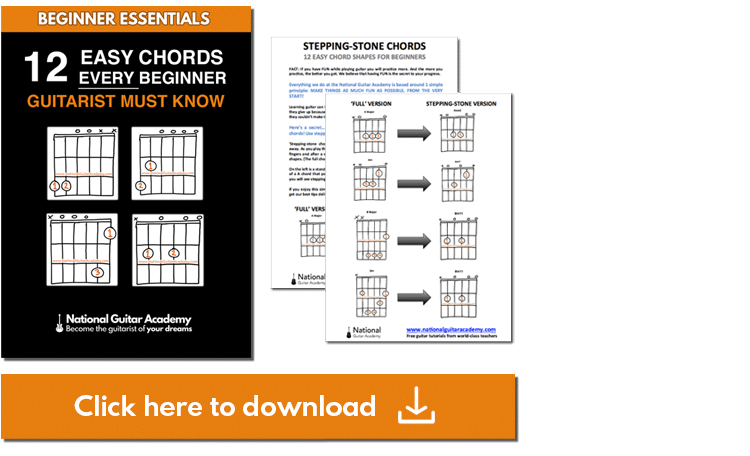
✅ Stop struggling. Start making music.
✅ Learn beginner-friendly versions of every chord.
This is our most popular guide and it will improve your chord ability quickly! 😎
Get your own personalised guitar-learning plan 🎸
Get a custom guitar-learning plan here: Click here for GuitarMetrics™
World-Class Guitar Courses 🌎
Learn from the world's best guitar educators: Click here for our guitar courses
Try our favourite guitar-learning game
If you’re looking for a fun way to practice, learn new songs, and improve your skills, consider trying Rocksmith+. It offers a gamified approach to guitar learning with over 7,500 real songs and covers.
How to learn guitar step 2: Learn to tune your guitar accurately and quickly
A good guitar tuner is a wise & worthwhile investment.
There are 4 main types: microphone-based tuners, vibration-based tuners, pedal tuners and smartphone apps.
Microphone-based tuners need to ‘hear’ the guitar notes to tune. (You can also plug in electric and electro-acoustic guitars on most modern tuners.)
Vibration-based tuners clip on to the guitar and tune by vibration. (They can still tune in a noisy environment, unlike microphone-based tuners.) My favourite is the Snark clip-on tuner.
Pedal tuners are very accurate tuners for electric, bass and electro-acoustic guitars. The BOSS TU-3 is exceptional for this and extremely durable.
Smartphone apps can tune your guitar quickly and cheaply. There’s tons of free ones out there.
To learn more about tuning and tuners read Rob’s article:
Here’s a quick demo of a guitar tuner in action.
Some guitars and amps come with built-in tuners. These can be handy, but they’re rarely as good as dedicated tuners.
As you learn more you’ll find you don’t always need to use a tuner to tune. But as a beginner, having a tuner is essential.
How to learn guitar step 3: Learn the names and numbers of your guitar strings
This is an all too common conversation I find myself having with guitar students:
Me: Could you play your ‘A’ string?
Student: Which one’s the ‘A’ string again?
Me: The fifth string.
Student: Which way are the strings numbered again?
Figuring out how to learn guitar will be difficult for you if you don’t know which string is which!
It’s important for you to be able to communicate effectively not just with a teacher, but also with other musicians. (Especially if you want to play in a band some day.)
Going from the thickest to the thinnest our guitar strings are: E A D G B E.
A good way to remember this is:
Elephants And Donkeys Grow Big Ears.
Or…
Eddie Ate Dynamite, Good Bye Eddie.
You pick!
‘Shouldn’t the 1-6 be the other way around?’
Our strings are numbered 1 to 6 going from the thinnest to the thickest. This is a bit confusing for beginners because when we strum we normally start with the thickest string, so people tend think of that as the first string.
If you want to understand how to learn guitar there’s a couple of idiosyncrasies like this that you’ll get used to after a while. 🙂
For more info on guitar notes and the musical alphabet (including ‘sharps’ and ‘flats’) read this article by Jack and Mike:
How to learn guitar step 4: Learn your basic chords
Regardless of genre, if you want to know how to learn guitar, you MUST know your chords. (Even if you dream of being a solo-twiddling lead guitar legend you still need to know your chords.)
There’s an entire section of this site dedicated to easy beginner chords, so have a good look around there. Chords are an essential part of understanding how to learn guitar.
The easiest way to learn chords is to follow Mike’s stepping-stone approach.
For every chord you see, there is an easy version. As a beginner, you simply will not be able to play chords like F or B.
So, you have two choices:
- Chew off your own fingers in frustration
- Learn an easier version of the chord
Choosing option 2 allows you to have fun playing music while developing your dexterity and control. This allows you to ‘graduate’ to playing the more difficult chord versions later.
If these chordboxes don’t make sense to you, read our article ‘How To Read Chordboxes In 60 Seconds‘.
(Figuring out how to learn guitar will be impossible if you can’t read chordboxes!)
Download our lead guitar cheat-sheet to make things easier
It's hard to understand which scales work with which keys.
So we created a cheat-sheet! A key and scale-finder that you can use again and again.
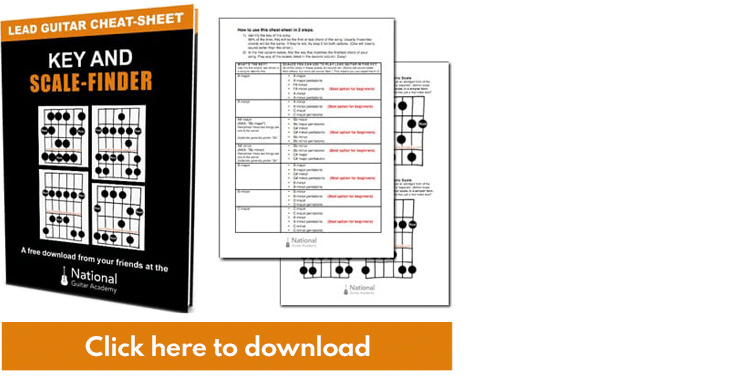
Get your personalised guitar-learning plan 🎸
Get a custom guitar-learning plan here: Click here for GuitarMetrics™
World-Class Guitar Courses 🌎
Learn from the world's best guitar educators: Click here for our guitar courses
The importance of perseverance
Even if your chords sound a bit clunky at first and even if they take a long time to change one to the other, you must persevere. As long as you use easy chords you will improve quickly.
These things take time and patience, but if we know the chord shapes and the chord names, we’re on the right track.
If the chords aren’t sounding right it could be that your fingers aren’t pressing correctly. Use the very tips of the fingers, not the fingerprints.
Understanding how to learn guitar boils down to two things: knowing what to do with your left hand and your right hand.
- Left hand = chords
- Right hand = strumming
How to learn guitar step 5: Learn how to strum
Of all the different components that go into making music, the melody, the harmony, the form… The most important of all is the RHYTHM.
We can make music that doesn’t have melody, we can make music that doesn’t have harmony and we can make music that doesn’t have any set form, however, music cannot be made without RHYTHM.
If you want to know how to learn guitar, you must be able to strum chords rhythmically.
The most common mistake I see people make when learning to strum is trying to put too much power into their strums.
Relax dude, you don’t need to strum hard; even if you want to play loud, you don’t need to strum powerfully.
As much as I love the music of Pete Townsend, he is a bad influence because his trademark windmilling approach to guitar playing has convinced a lot of people that that’s how it’s done.
Check him out at 4 mins 30 seconds into this video, amazing! 🙂
This is an entertaining piece of stagecraft, but it’s not how you should aim to play your guitar.
“But I’m into metal! I’m into punk! I want to play loud!” you may be saying. You don’t have to strum hard to play loud.
Playing in time is more important than playing loud, no matter what the style of music and learning to strum in time and with rhythm should be your number one aim as a guitar learner.
Check out this article by Mike, it will help you a lot:
Get our best guitar tips & videos
Where should we send it?
Where should we send it?


